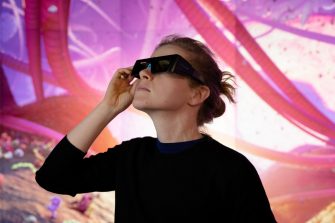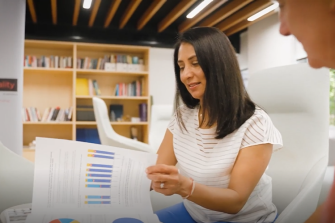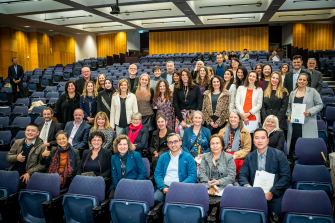Arts, Design & Architecture Short Courses
Upskill with purpose. Lead with impact.

Empower your professional journey
UNSW Arts, Design & Architecture short courses offer flexible pathways to expand your thinking and strengthen your professional capability. Led by experts across six schools and six research centres, these courses combine academic rigour with real-world insight to help you build skills, deepen understanding and prepare for your next step.
Explore by school or research centre

School of Art & Design
UNSW School of Art & Design is one of Australia’s largest, most dynamic and most diverse creative art, design and media schools. They offer more disciplines and interdisciplinary study opportunities than any other Australian creative school.
Browse our range of short courses delivered by academic and industry experts from the UNSW School of Art & Design:
- Foundations of 3D Biomedical Animation
- Immersive Technology for Simulation-Based Educators
- Learning Science for Simulation-Based Educators
- Design for Everyone: Bridging the Gap Between Desirable Designs and Accessibility Series

School of Built Environment
UNSW School of Built Environment's focus is to create sustainable, liveable cities. They are home to global leaders in architecture, planning, construction and design, connecting world-class knowledge with leading practice.
Browse our range of short courses delivered by academic and industry experts from the UNSW School of Built Environment:

School of Education
UNSW School of Education is driven by dynamic initial teacher education programs, acclaimed research innovations, professional learning opportunities and commitment to improving education.
Browse our range of short courses delivered by academic and industry experts from the UNSW School of Education:

School of Humanities & Languages
UNSW School of Humanities & Languages is one of Australia’s leading centres of teaching and research excellence in humanities and languages. Their mission is to educate students to become global citizens through critical thinking skills, historical, cultural and linguistic understanding, language learning, and an informed engagement with the world.
In partnership with Multicultural NSW through the Multilingual Academy program, we offer short course training for future interpreters and translators.
These short courses include:
- Introduction to Interpreting Fundamentals
- Introduction to Translation Fundamentals
- Introduction to Legal Interpreting
Seeking something similar for your organisation? Get in touch today!

Research Centres
UNSW Arts, Design & Architecture host and participate in a number of world-leading research centres and institutes recognised for their high-impact research and engagement, locally and globally. Their investigations advance understanding of cities, people, places and technology. They conduct critical social enquiry into the intersections between inequality, wellbeing and justice, or use arts-led approaches and thinking to generate new insights into globally important issues.
Browse our range of short courses delivered by academic and industry experts from a variety of UNSW Research Centres:
Course Finder
In Conversation
Explore the ideas behind our short courses in our In Conversation series, featuring insights from academic convenors, guest speakers and students that connect research with real-world questions. Learn their unique perspectives and the themes that shape our courses.
GERRIC
GERRIC contributes to many aspects of the education and development of gifted students. Whether you’re a teacher interested in helping gifted students thrive, a parent wanting to understand how to support your talented child or an advanced student looking for a greater challenge, GERRIC is for you.
What we can do for your business
We partner with professional bodies to deliver short course training.
Contact us if you have a need for tailored training within your organisation.
Why do an Arts, Design & Architecture short course
Gain practical skills, critical perspective and creative confidence to shape the future through impactful design and cultural innovation.
- Shape the future
- Social impact
- Microcredentials
- Digital badging


Earn a digital badge
Upon successful completion of our short courses, you will receive a digital badge as a record of your course learning. This badge verifies your achievement and can be shared with your professional network to highlight your new skills and commitment to continuous learning.
Next steps
If you have questions, our team is ready to assist so you can explore your options and create impact through creativity, research and innovation.





